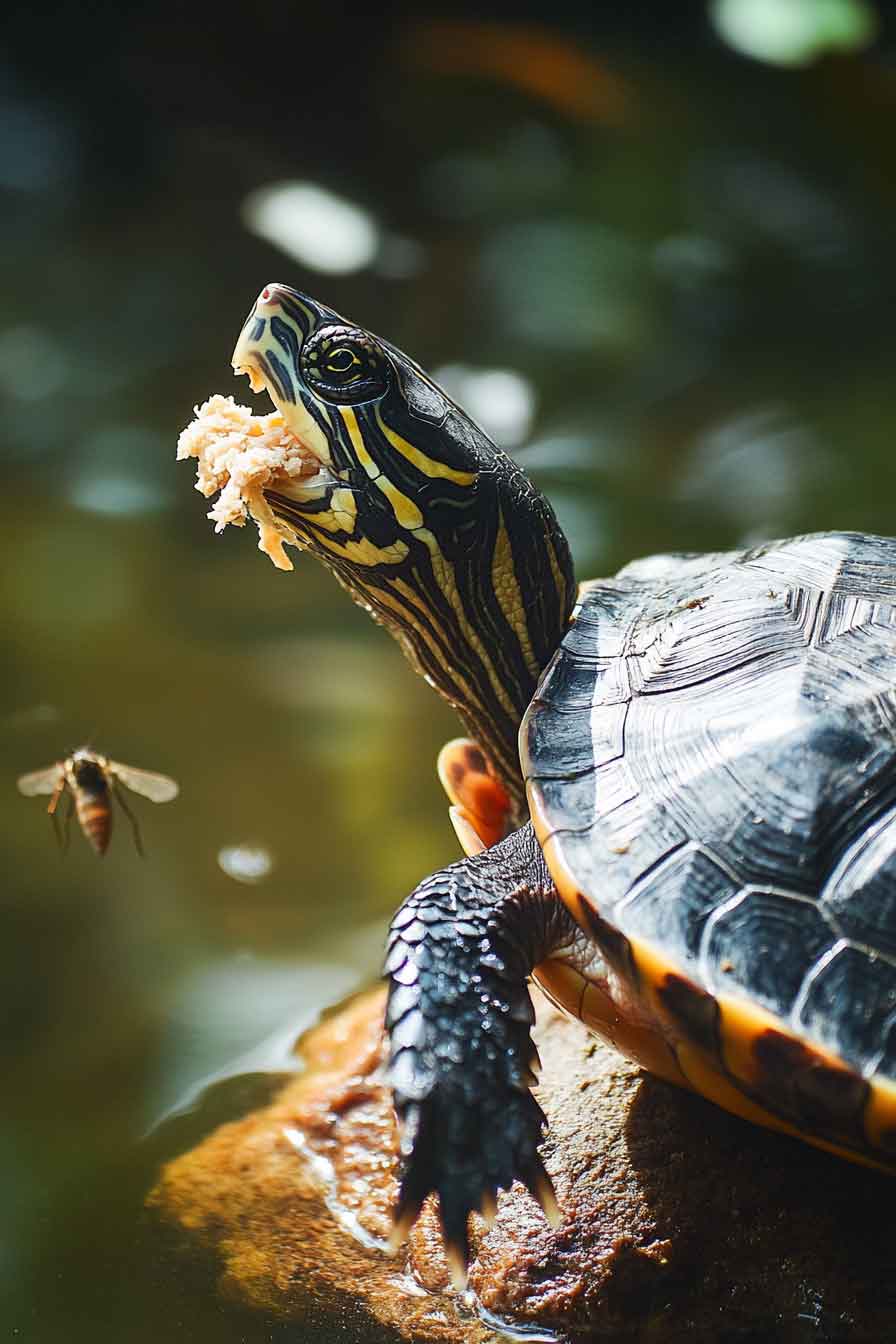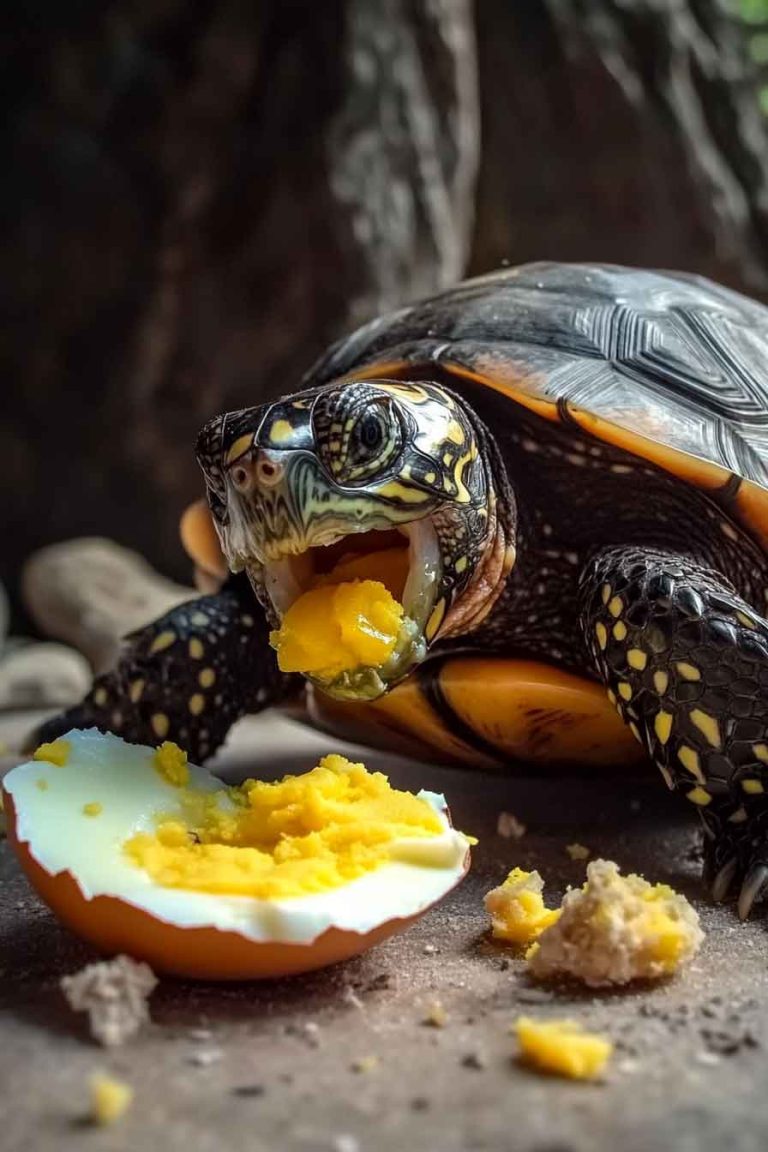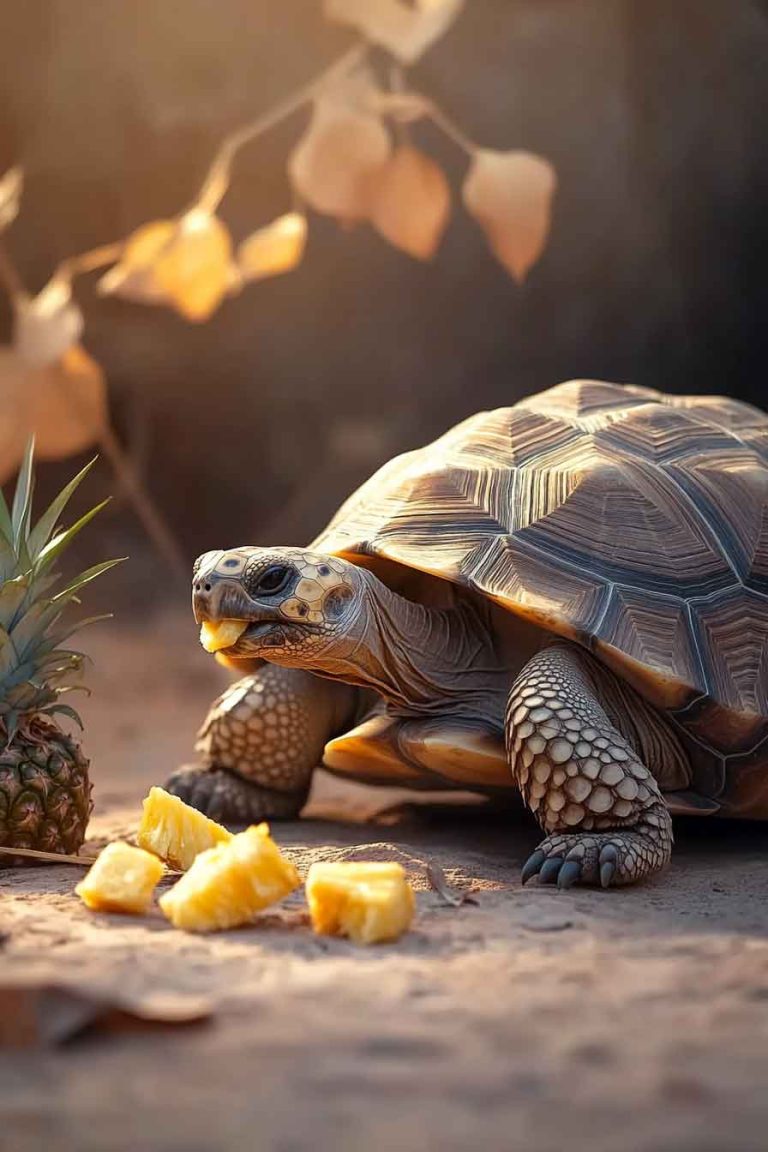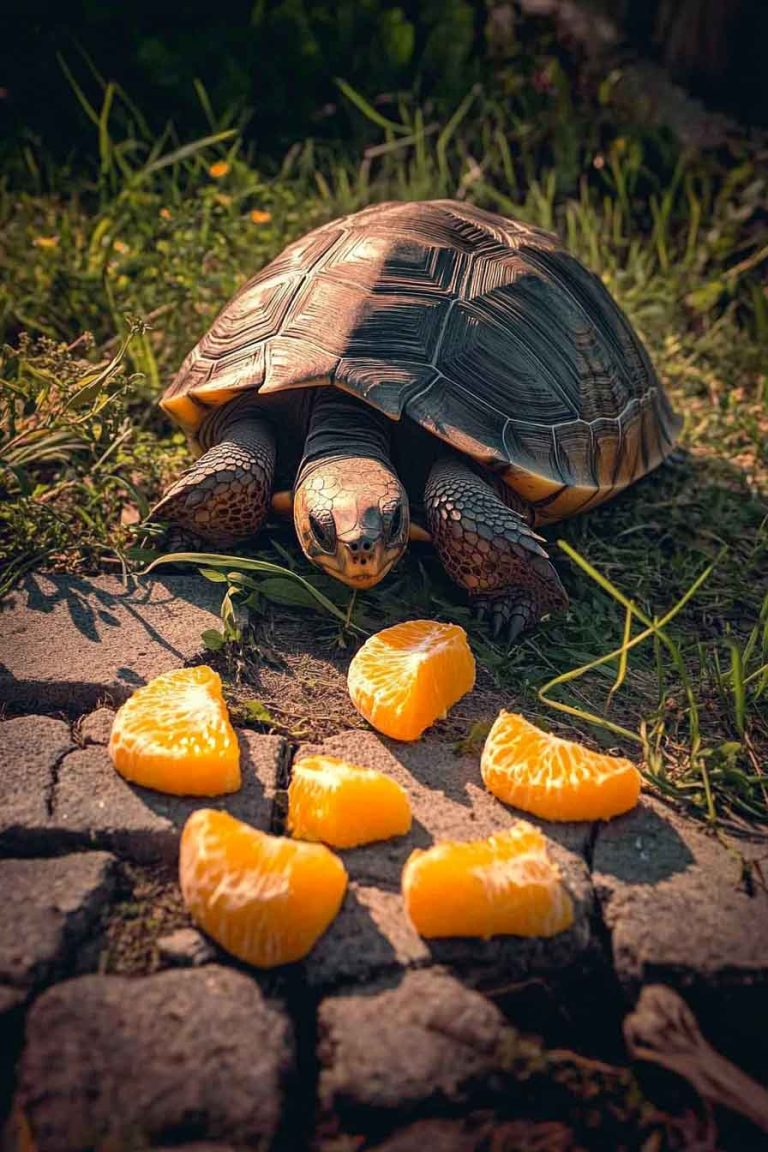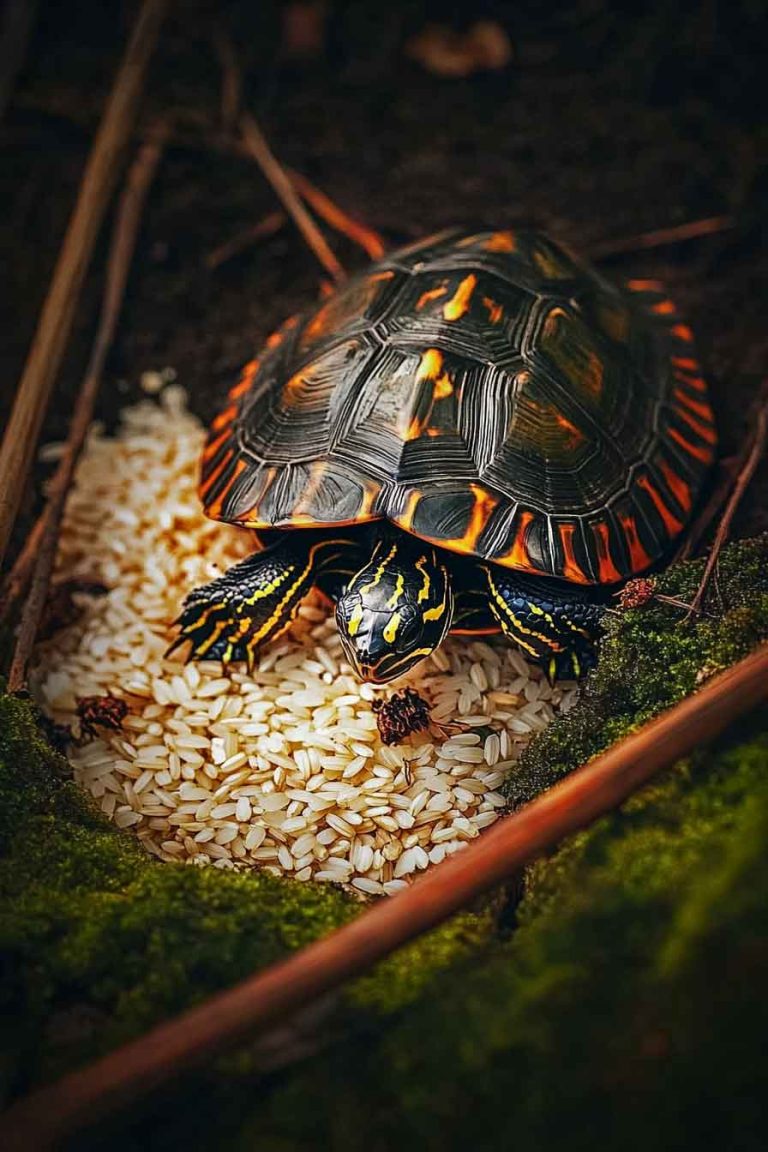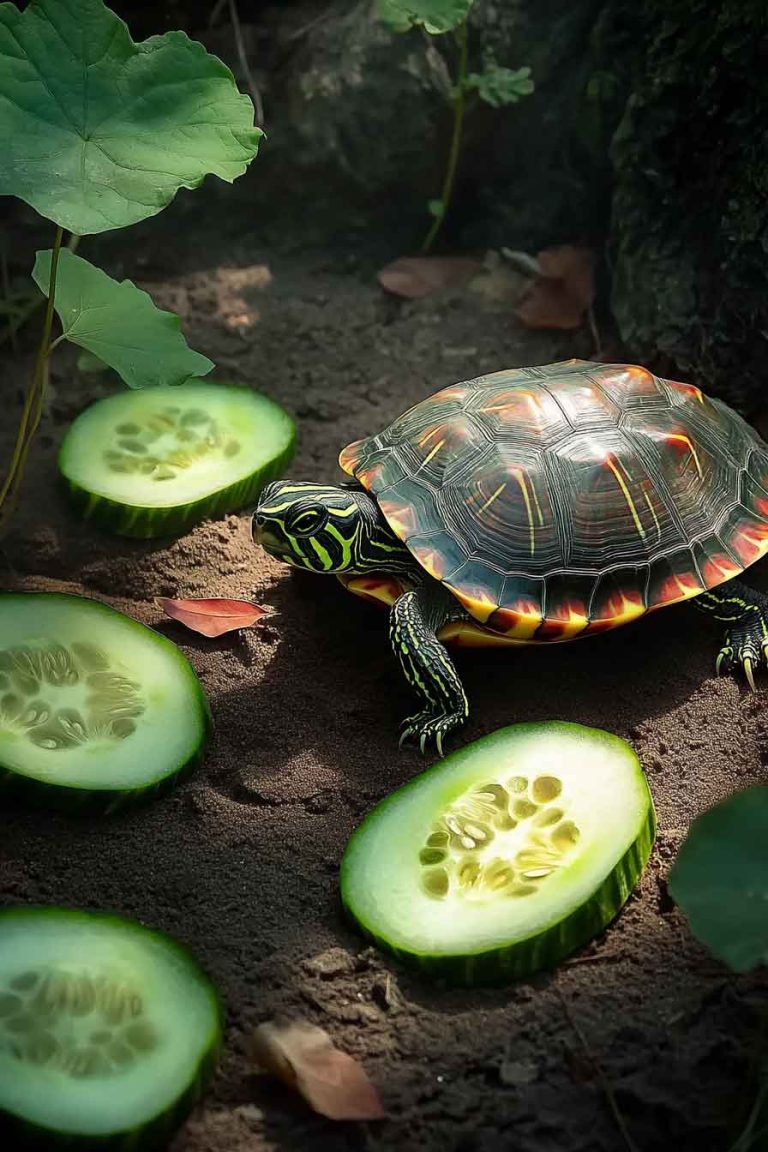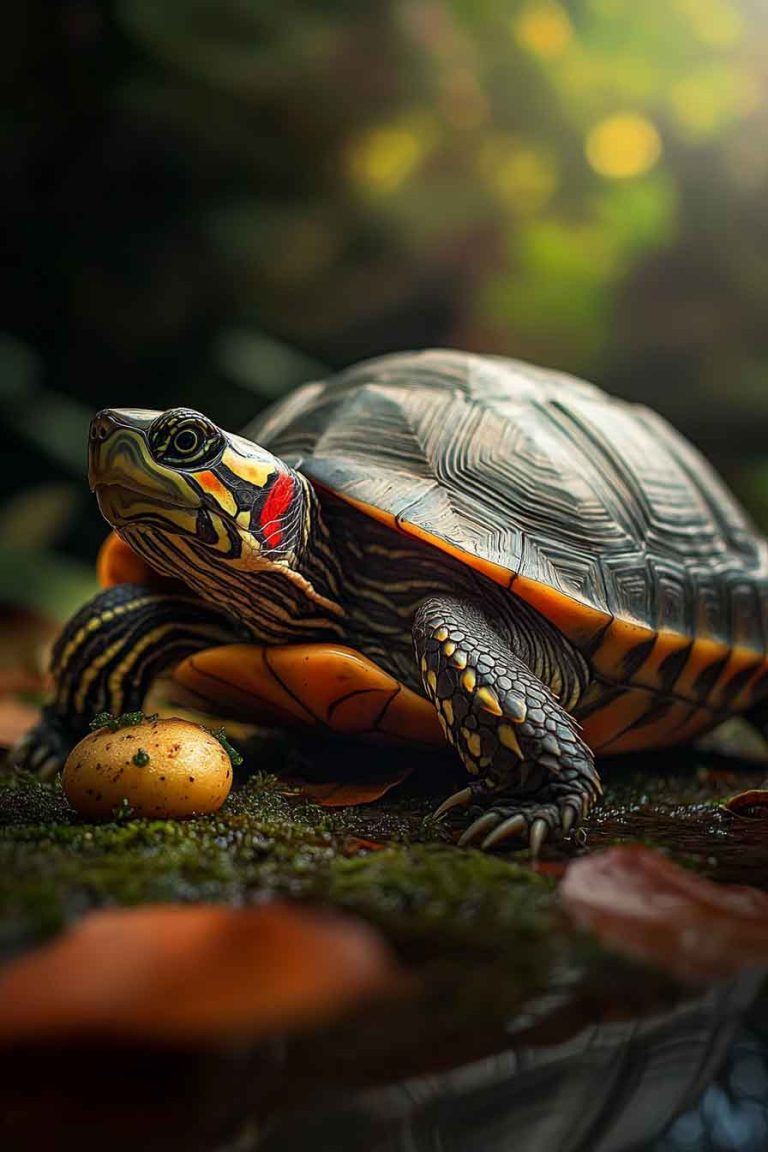Can Turtles Eat Chicken? Don’t Feed It Before Reading
If you’re like me and have a beloved pet turtle, you’ve probably found yourself wondering whether you can share some of your dinner with your shelled friend. I know I’ve been tempted to offer my turtle a piece of chicken from my plate – after all, many turtle species are omnivores, right? But when it…
If you’re like me and have a beloved pet turtle, you’ve probably found yourself wondering whether you can share some of your dinner with your shelled friend. I know I’ve been tempted to offer my turtle a piece of chicken from my plate – after all, many turtle species are omnivores, right? But when it comes to chicken, the answer isn’t as straightforward as you might think.
So, can turtles eat chicken? The answer is yes, but with significant limitations. While turtles can technically consume small amounts of properly prepared chicken, it’s not an ideal food choice for them. Chicken should only be given as an occasional treat, never as a staple food, and there are specific preparations and precautions you need to follow to keep your turtle safe.
In this comprehensive guide, I’m going to walk you through everything you need to know about feeding chicken to turtles, including the risks, benefits, and safer alternatives. Let’s dive in and ensure your turtle stays healthy and happy.
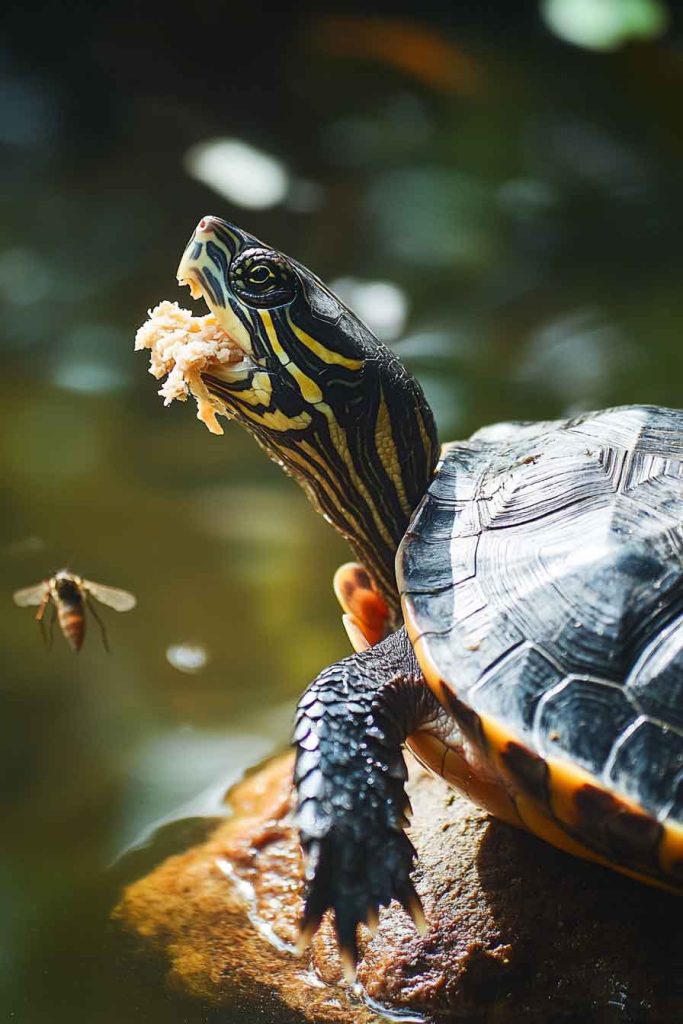
Can You Feed Chicken To Your Pet Turtle?
The short answer is – yes, but very cautiously. Many people assume that since some turtle species eat fish and insects in the wild, chicken would be a natural fit. However, domestic chicken presents unique challenges that make it far from ideal for our reptilian companions.
Turtles have evolved digestive systems that are quite different from mammals. While omnivorous turtle species can process animal proteins, they’re adapted to consume smaller prey items like fish, insects, worms, and aquatic creatures – not large chunks of poultry.
Let me break down the nutritional content of 100 grams of chicken breast to help you understand why moderation is key:
- Protein: 31 g
- Fat: 3.6 g
- Phosphorus: 220 mg
- Calcium: 15 mg
- Sodium: 74 mg
- Potassium: 256 mg
- Iron: 0.7 mg
- Zinc: 1 mg
Looking at these numbers, you can immediately see several red flags. The calcium-to-phosphorus ratio is heavily skewed toward phosphorus (approximately 1:15 ratio), which is the opposite of what turtles need. Turtles require a 2:1 calcium-to-phosphorus ratio for proper shell and bone development.
The high protein content, while beneficial in small amounts, can stress a turtle’s kidneys if given regularly. Additionally, the sodium content can be problematic for turtles, as they’re not equipped to handle high-sodium foods like many commercially prepared meats.
Do Turtles Like Chicken?
In my experience, most turtles will readily accept chicken if offered, which can be both a blessing and a curse. Turtles are naturally curious about food and will often try new items presented to them. However, just because they’ll eat it doesn’t mean they should.
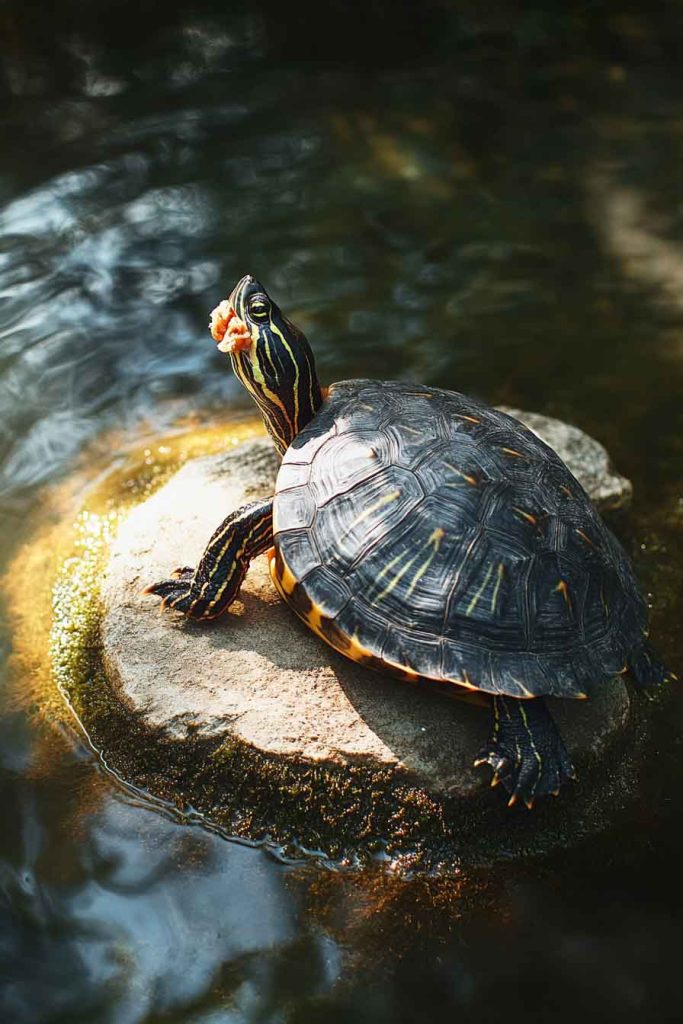
I’ve observed that turtles tend to be more interested in the texture and movement of food rather than specific flavors. A small piece of chicken might appeal to them simply because it’s something new, but this doesn’t indicate nutritional appropriateness.
Health Risks for Turtles Eating Chicken
While chicken isn’t as immediately toxic as some foods (like onions), it does present several significant health risks when fed improperly or too frequently.
Kidney Stress and Protein Overload
Turtles process protein differently than mammals do. Their kidneys aren’t designed to handle the high protein loads that chicken provides. Feeding too much chicken can lead to kidney stress, which manifests as lethargy, decreased appetite, and in severe cases, kidney failure.
I’ve seen cases where well-meaning turtle owners fed their pets chicken regularly, thinking they were providing good nutrition, only to end up with turtles suffering from kidney problems that could have been avoided.
Calcium-Phosphorus Imbalance
This is perhaps the most serious long-term risk. The poor calcium-to-phosphorus ratio in chicken can lead to Metabolic Bone Disease (MBD) over time. MBD causes:
- Soft, deformed shells
- Brittle bones
- Growth deformities
- Difficulty moving
- Increased susceptibility to infections
The phosphorus in chicken actually binds to calcium in the turtle’s body, making it unavailable for shell and bone maintenance. This is why the calcium-to-phosphorus ratio is so critical.
Bacterial Contamination
Raw chicken poses significant risks due to potential bacterial contamination, including Salmonella and Campylobacter. While turtles can carry Salmonella naturally, introducing additional bacterial loads through contaminated chicken can overwhelm their systems and cause serious illness.
Even cooked chicken can harbor bacteria if not prepared and stored properly, making it a risky choice for turtle feeding.
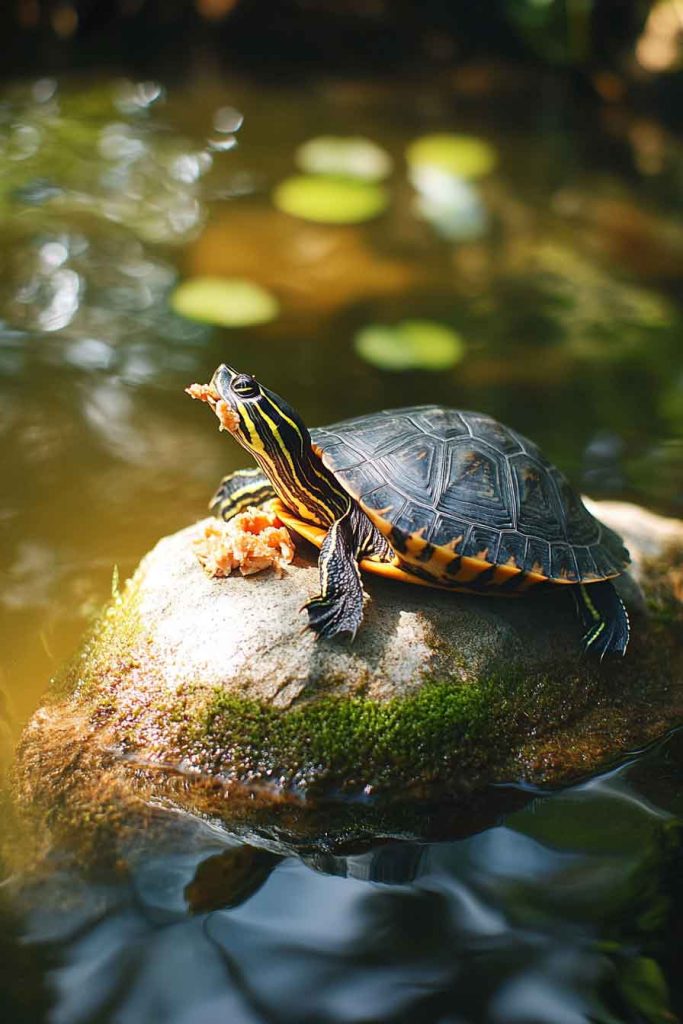
Can Turtles Eat Chicken Wings?
Can turtles eat chicken wings? This is where things get particularly concerning. Chicken wings should absolutely never be given to turtles. Wings contain small, splintery bones that pose choking hazards and can cause internal injuries. Additionally, wings are typically higher in fat content than other parts of the chicken, which can lead to digestive issues.
The skin on chicken wings is also problematic, as it’s high in fat and often contains seasonings or marinades that are toxic to turtles. Even plain, cooked chicken wings without seasoning are inappropriate due to the bone structure and fat content.
Can Turtles Eat Chicken Bones?
Can turtles eat chicken bones? Absolutely not, and this cannot be stressed enough. Chicken bones are extremely dangerous for turtles for several reasons:
- Splintering: Cooked chicken bones become brittle and can splinter, causing choking or internal injuries
- Size: Chicken bones are too large for most turtles to process safely
- Digestive blockage: Bone fragments can cause intestinal blockages requiring emergency veterinary intervention
- Sharp edges: Even raw chicken bones can have sharp edges that damage the turtle’s digestive tract
If you’re considering bones for calcium supplementation, there are much safer alternatives available, such as cuttlebone or calcium supplements specifically designed for reptiles.
Can Turtles Eat Raw Chicken?
Can turtles eat raw chicken? While technically possible, I strongly advise against feeding raw chicken to pet turtles. Raw chicken carries significant risks:
- Bacterial contamination: High risk of Salmonella, Campylobacter, and other harmful bacteria
- Parasites: Raw poultry can contain parasites that can infect turtles
- Nutritional imbalance: Same calcium-phosphorus ratio issues as cooked chicken
- Preparation concerns: Difficulty ensuring proper hygiene and safe handling
Wild turtles occasionally consume carrion, but they’ve evolved natural defenses and beneficial gut bacteria that captive turtles may lack. The controlled environment of captivity means we need to be more careful about food safety.
How Much Chicken Should Turtles Eat?
If you decide to offer chicken as an occasional treat, portion control is absolutely critical. Here are my recommendations:
- Frequency: No more than once every 2-3 weeks
- Portion size: A piece no larger than the turtle’s head
- Preparation: Only plain, fully cooked chicken breast with all skin and fat removed
- Age consideration: Never feed chicken to baby turtles under 6 months old
Remember, chicken should never make up more than 5% of an adult turtle’s diet. The majority of their nutrition should come from species-appropriate foods like leafy greens, aquatic plants, appropriate fruits, and commercial turtle pellets.
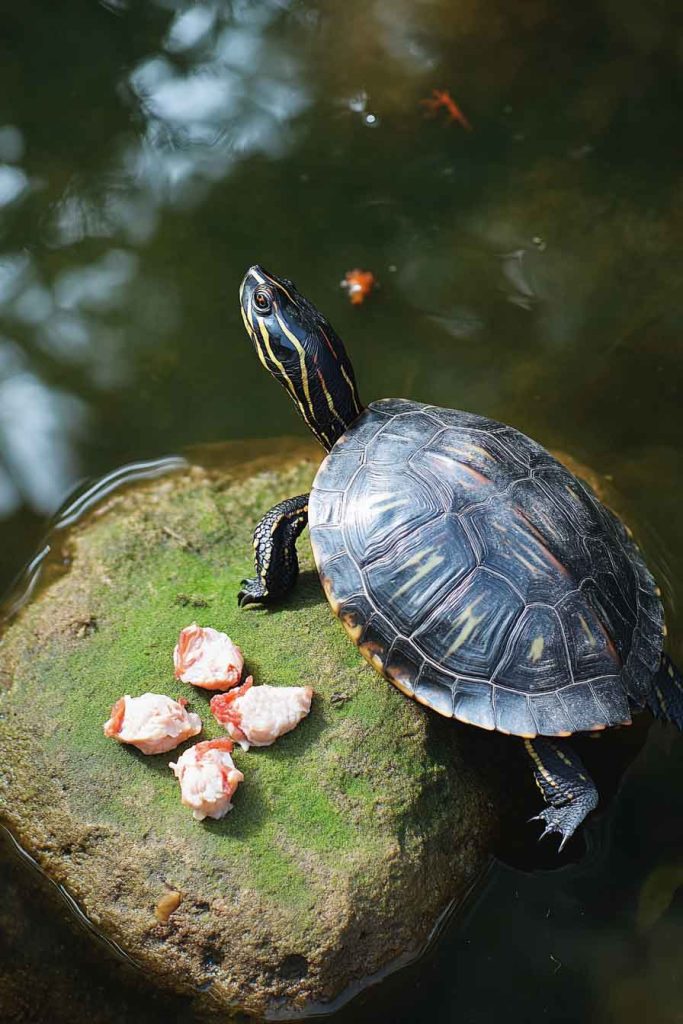
Can You Feed Chicken to Baby Turtles?
I cannot recommend feeding chicken to baby turtles under any circumstances. Baby turtles have even more sensitive digestive systems and higher calcium requirements for proper shell development. Their kidneys are also less developed, making them more susceptible to protein overload.
Baby turtles should stick to:
- High-quality commercial turtle pellets designed for juveniles
- Small pieces of appropriate vegetables
- Tiny prey items like bloodworms or brine shrimp (species-dependent)
- Calcium supplements as recommended by a reptile veterinarian
Safer Protein Alternatives for Turtles
Instead of chicken, consider these safer protein options for your turtle:
For Aquatic/Semi-aquatic Turtles:
- Small feeder fish (properly sourced)
- Bloodworms
- Brine shrimp
- Commercial turtle pellets
- Small pieces of cooked shrimp (unseasoned)
For Box Turtles and Land Species:
- Earthworms
- Crickets (gut-loaded)
- Snails
- Commercial turtle food
- Small amounts of hard-boiled egg (occasionally)
These alternatives provide more appropriate nutrition profiles and are much safer for regular feeding.
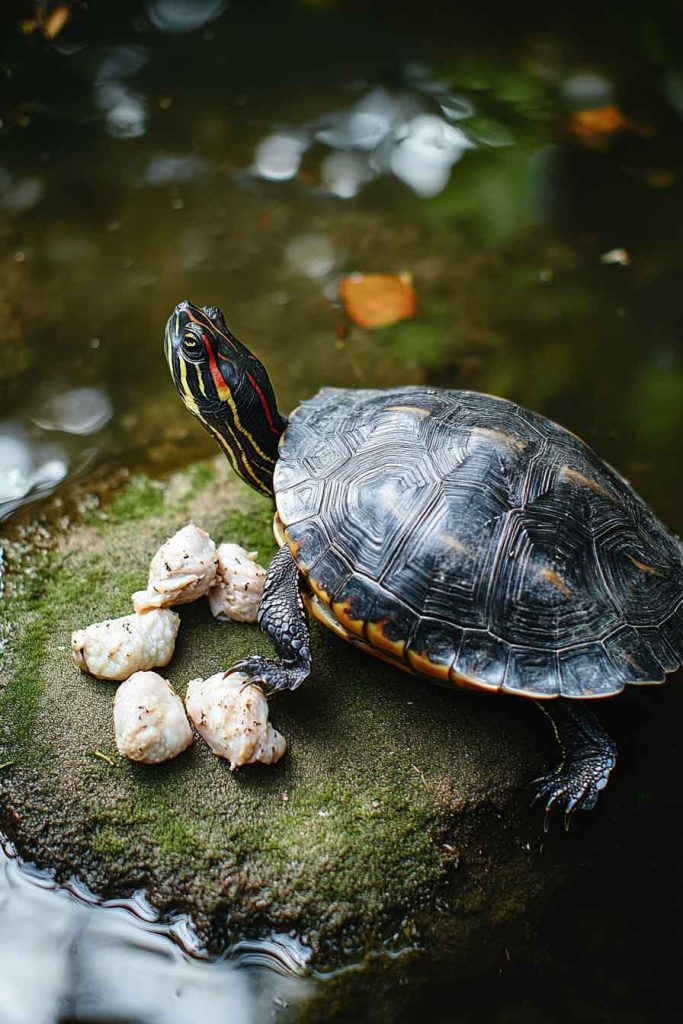
Frequently Asked Questions (FAQs)
Can Box Turtles Eat Chicken? Box turtles are omnivores with slightly different dietary needs, but chicken still presents the same risks. While they might be able to handle very small amounts better than aquatic species, it’s still not recommended. Stick to insects, worms, and appropriate vegetables for box turtles.
Can Red-Eared Slider Turtles Eat Chicken? Red-eared sliders are primarily aquatic and have adapted to eat fish, aquatic insects, and plants. Chicken is particularly inappropriate for them as their digestive systems are optimized for aquatic prey. The high protein and poor mineral balance can cause serious health issues.
Can Painted Turtles Eat Chicken? Painted turtles have similar dietary needs to red-eared sliders. They’re adapted to aquatic environments and should not be fed chicken. Their natural diet consists of aquatic vegetation, small fish, and aquatic invertebrates.
What to Do If Your Turtle Accidentally Eats Chicken
If your turtle accidentally consumes chicken, don’t panic, but do monitor them closely. Watch for:
- Changes in appetite
- Lethargy or unusual behavior
- Difficulty defecating
- Signs of digestive distress
If you notice any concerning symptoms, contact a reptile veterinarian immediately. Most single incidents won’t cause lasting harm, but repeated exposure can lead to serious health issues.
Conclusion
While turtles can technically eat small amounts of properly prepared chicken, it’s far from an ideal food choice for our shelled companions. The risks – including kidney stress, calcium-phosphorus imbalances, and potential bacterial contamination – far outweigh any potential benefits.
As responsible turtle owners, we should focus on providing species-appropriate diets that mirror what our turtles would eat in their natural habitats. There are plenty of safer, more nutritious options available that will keep your turtle healthy and thriving.
Remember, when it comes to turtle nutrition, it’s always better to err on the side of caution. Your turtle’s long-term health is worth more than the convenience of sharing your dinner. Stick to proven, safe foods, and your turtle will thank you with years of healthy, active life.
If you’re ever unsure about what to feed your turtle, consult with a veterinarian who specializes in reptiles. They can provide personalized advice based on your turtle’s species, age, and individual health needs.

